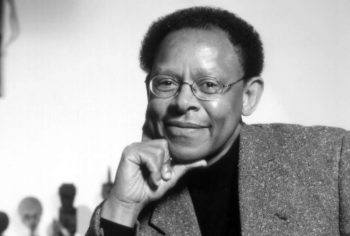Cornel West in Boston Review:
 My dear brother, James Cone. Words fail. Any language falls short. Yes, he was a world-historical figure in contemporary theology, no doubt about that. A towering prophetic figure engaging in his mighty critiques and indictment of contemporary Christendom from the vantage point of the least of these, no doubt about that. But I think he would want us to view him through the lens of the Cross and the blood at the foot of that cross. So, I want to begin with an acknowledgement that James Cone was an exemplary figure in a tradition of a people who have been traumatized for 400 years but taught the world so much about healing; terrorized for 400 years and taught the world so much about freedom; hated for 400 years and taught the world so much about love and how to love. James Cone was a love warrior with an intellectual twist, rooted in gutbucket Jim Crow Arkansas, ended up in the top of the theological world but was never seduced by the idles of the world.
My dear brother, James Cone. Words fail. Any language falls short. Yes, he was a world-historical figure in contemporary theology, no doubt about that. A towering prophetic figure engaging in his mighty critiques and indictment of contemporary Christendom from the vantage point of the least of these, no doubt about that. But I think he would want us to view him through the lens of the Cross and the blood at the foot of that cross. So, I want to begin with an acknowledgement that James Cone was an exemplary figure in a tradition of a people who have been traumatized for 400 years but taught the world so much about healing; terrorized for 400 years and taught the world so much about freedom; hated for 400 years and taught the world so much about love and how to love. James Cone was a love warrior with an intellectual twist, rooted in gutbucket Jim Crow Arkansas, ended up in the top of the theological world but was never seduced by the idles of the world.
That is who we are talking about. And, oh, he loved us so. And I loved him so, I would have taken a bullet for him and he would have taken a bullet for me, even as we would have been dancing around them to get out of the way because we wanted to be together.
There is no James Cone without his parents, Lucy and Charlie. In his great The Cross and the Lynching Tree (2011)—a text that will last as long as there is an American empire shot through with white supremacy and predatory capitalism and homophobia and transphobia and patriarchy—he concludes the acknowledgements by thanking Lucy and Charlie, because their “amazing love and wonderful humor . . . created a happy home that kept us from hating anybody.”
More here. (Note: Throughout February, we will publish at least one post dedicated to Black History Month)
